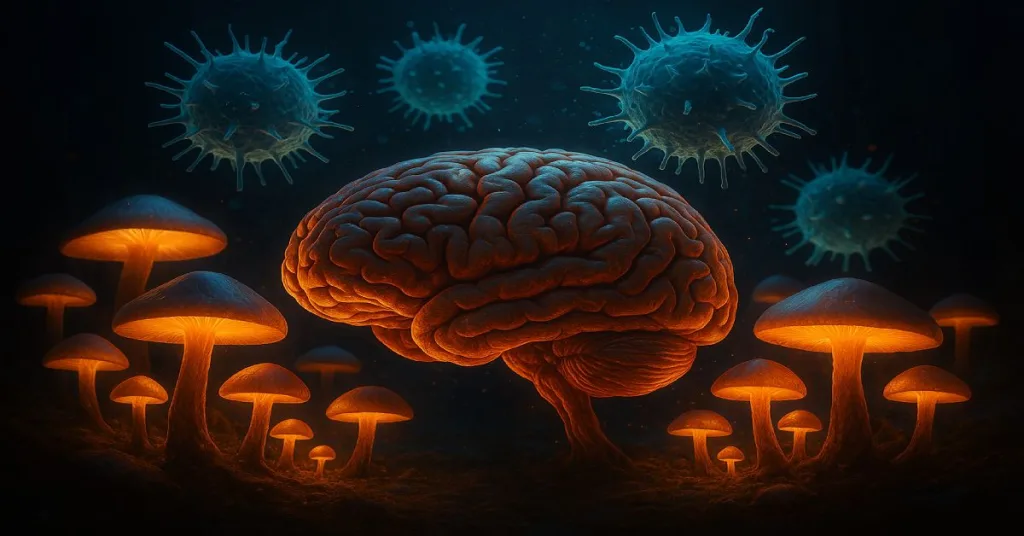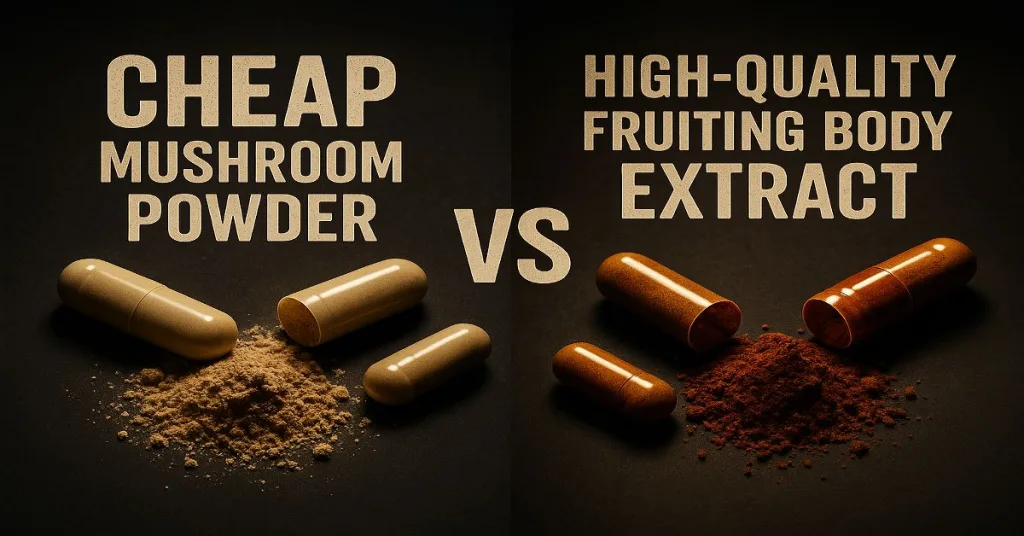Why Mushrooms Are Everywhere
Walk into any supplement aisle or scroll through wellness feeds, and mushroom supplements are everywhere. They’re packed into gummies, blended into tinctures, ground into powders, and sold in bottles of capsules that range from bargain-bin cheap to boutique-priced luxury. At Walmart, you can grab a mushroom blend for the cost of lunch. On the other side of the spectrum, a bottle of AHCC — a fermented shiitake extract — can set you back well over a hundred dollars.
The buzz spans every corner of the health world. Biohackers praise lion’s mane for mental clarity. Athletes turn to cordyceps for stamina. Wellness influencers show off reishi teas as the answer to stress. Cancer patients in Japan even receive mushroom-derived extracts as part of their treatment protocols.
But here’s the problem: not all mushrooms are created equal, and not all claims are backed by solid science. Some benefits are plausible, even promising. Others are overstated, under-researched, or simply repackaged folklore. If you’ve been taking mushroom supplements for months or years and can’t tell whether they’re doing anything, you’re not alone. This is the definitive deep dive into what’s hype, what’s proven, and what’s just smart marketing.
This article contains affiliate links. If you buy through them, we may earn a commission at no extra cost to you.
1. The Long History vs. Modern Hype
Mushrooms have been revered for centuries. In traditional Chinese medicine, reishi was called the “mushroom of immortality.” Cordyceps, once so rare it was reserved for emperors, was considered a vitality booster. Lion’s mane was consumed by monks for its supposed ability to sharpen the mind.
These stories create an aura of authority around mushrooms. But tradition doesn’t equal proof. Ancient healers didn’t have controlled studies, peer review, or double-blind trials. What they had was anecdotal experience passed down through generations.
Modern mushroom supplements lean heavily on that history while dressing it in scientific language. Labels tout “polysaccharides” and “beta-glucans,” often without context. The truth is that much of the research is still in its infancy. That doesn’t mean mushrooms don’t work — but it does mean you should separate myth from measurable evidence.

2. Do Mushrooms Actually Work?
What the Science Shows (and Doesn’t)
The compounds most often linked to mushroom benefits are beta-glucans — complex sugars that interact with the immune system. These molecules can prime immune cells, but mushrooms aren’t the only source. Grains like oats and barley contain them too.
The issue is research quality. Many mushroom studies are conducted in animals or in test tubes, not in large human populations. The human trials that do exist are often small, short, or funded by supplement companies. Still, a handful of mushrooms stand out.
- Reishi has been studied for its effects on fatigue, sleep, and immune modulation. Some users report calmer moods or better rest, but the changes are usually subtle.
- Lion’s Mane is especially intriguing for brain health. Early studies suggest it may support the production of nerve growth factor, a protein involved in neuron repair and maintenance. People with mild memory issues showed small improvements, but it’s far from a proven cognitive enhancer.
- Cordyceps has a reputation as a stamina booster. Some studies report better oxygen utilization during exercise, but results are inconsistent. Many athletes don’t notice much difference.
- Turkey Tail is one of the best studied, particularly in Japan, where specific extracts (PSK and PSP) are prescribed alongside cancer treatments. These extracts are pharmaceutical-grade and not the same as the powders sold in U.S. health stores.
- AHCC is heavily marketed as a premium immune booster. Some promising results exist, but most research is limited, small, or tied to the companies that make it.
The takeaway? Mushroom supplements aren’t scams, but they aren’t miracle pills either. For most people, any benefits are gradual, quiet, and easy to overlook.
3. Why Can They Be Sold If They’re Not Proven?
The mushroom market exists thanks to one thing: weak regulation.
In the United States, supplements fall under the Dietary Supplement Health and Education Act of 1994 (DSHEA). That law gives companies wide leeway to sell products without proving effectiveness. Unlike pharmaceuticals, supplements don’t need to demonstrate results before hitting store shelves.
The only hard rule? They can’t claim to cure or treat specific diseases. Instead, they use softer language: “supports immune health,” “promotes energy,” “helps maintain balance.” It’s vague enough to stay legal but persuasive enough to sell bottles.
Unless a supplement is proven unsafe, regulators rarely step in. That’s why mushrooms — even when research is thin — are everywhere. Proof of benefit is optional.
4. Mushrooms on the Market: Cheap vs. Expensive
The Real Quality Divide
Not all mushroom supplements are created equal.
Cheap products often use mycelium — the root-like threads that mushrooms grow from — instead of the fruiting body (the actual cap and stem). These are grown on grain, then dried and ground up. The result? A lot of filler, often more grain than mushroom. You’re essentially swallowing oatmeal dust with a hint of fungus.
High-end products, on the other hand, are made from fruiting body extracts, sometimes standardized to a specific percentage of beta-glucans. These are the compounds linked to immune activity. These supplements tend to be more expensive, but at least they contain measurable active ingredients.
Then there’s AHCC, a proprietary shiitake mycelia extract. It’s marketed as the Rolls Royce of mushroom supplements, with a price tag to match. Some human studies exist, but results aren’t universally strong, and much of the research is tied to AHCC’s manufacturers.
The Label Scam
One of the biggest tricks in the mushroom aisle is the label game. A bottle may proudly declare “500 milligrams of mushroom,” but that could mean mostly grain substrate with only traces of actual mushroom compounds. Without transparency about fruiting body use or beta-glucan content, you can’t know what you’re paying for.
That’s why so many people take mushrooms faithfully without ever feeling a difference: what they’re buying barely resembles the extracts used in clinical research.

5. Clinical vs. Supplement Reality
Here’s where things get messy. Clinical trials often use concentrated extracts in large amounts. Supplements on the shelf usually provide a fraction of that dose.
- Reishi in studies is often given in concentrated extracts equal to multiple grams per day. Most store-bought capsules contain only a fraction of that.
- Lion’s Mane trials for cognitive support used several grams daily, far more than the one or two capsules in most bottles.
- Turkey Tail extracts used in Japanese hospitals are pharmaceutical-grade and measured in grams. The powders in American supplements don’t compare.
- Cordyceps research often involves doses that dwarf the tiny amounts in a typical capsule.
- AHCC trials use several grams daily, but most supplements provide small capsules that would require handfuls a day to match the studied amounts.
The translation is simple: what’s studied in the lab is rarely what’s sold at the store. This disconnect explains why so many users say, “I’ve been taking mushrooms for months and can’t tell if they’re doing anything.”
6. Who Might Actually Benefit?
Even with the dosing gap, certain groups may notice subtle benefits.
- Immune support seekers may find turkey tail and reishi most promising. They’re not cures, but they can gently support immune balance.
- Cognitive health enthusiasts may gravitate toward lion’s mane. Early evidence is interesting enough to warrant trying, though expectations should be realistic.
- Athletes and energy seekers might experiment with cordyceps. Some notice improved stamina, but it’s far from guaranteed.
- Cancer patients should know that in Japan, specific turkey tail extracts are prescribed alongside conventional therapy. However, over-the-counter U.S. supplements are not equivalent to prescription products.
For most people, benefits are subtle and long-term rather than dramatic and immediate.
7. Who’s Wasting Their Money?
Not every mushroom shopper is making a smart purchase.
- People expecting mushrooms to act like caffeine, painkillers, or other quick-fix drugs will be disappointed. Mushrooms don’t work that way.
- Anyone buying cheap “mushroom complex” blends with no transparency about fruiting bodies or beta-glucan content is likely paying for filler.
- People who believe that one capsule a day is enough to replicate decades of cancer research are falling for marketing, not science.
8. Risks & Safety
Mushrooms are generally safe, but that doesn’t mean risk-free.
- Digestive upset is one of the most common side effects.
- Blood-thinning effects are possible with reishi and cordyceps, which could be risky for people on anticoagulant medications.
- Contamination is a concern, especially with cheap imports that aren’t third-party tested.
- Price traps exist at the premium end. Paying top dollar doesn’t always mean you’re getting higher-quality extracts.
The good news: serious side effects are rare. But quality and sourcing matter.
9. Bottom Line: Are Mushrooms Worth It?
Mushroom supplements occupy a strange middle ground. They’re not snake oil, but they’re not miracle cures either.
- Legit potential? Yes. Mushrooms do contain immune-modulating and brain-protective compounds.
- Proven miracle? No. Evidence is promising but limited, and clinical doses rarely match supplement labels.
- Worth trying? If you buy fruiting body extracts from trusted brands and take them consistently, you may experience subtle, long-term benefits. But don’t expect to “feel” mushrooms working overnight.
Think of them as gentle nudges to your health — not transformations.
10. Practical Buyer’s Guide
If you’re serious about trying mushroom supplements, here’s what to look for:
- Fruiting body extracts rather than mycelium on grain. The fruiting body is where most of the active compounds are concentrated.
- Beta-glucan percentage listed on the label. This is the key immune-active compound. If it only lists “polysaccharides,” be cautious — that can include inactive starch.
- Transparent dosing. Avoid proprietary blends where you don’t know how much of each mushroom you’re actually getting.
- Reputable brands that provide third-party testing and clear sourcing. Names worth watching include Host Defense, Real Mushrooms, Life Extension, and NOW.
you may like: Supplements 101: A Complete Beginner’s Guide to Building a Safe & Effective Routine